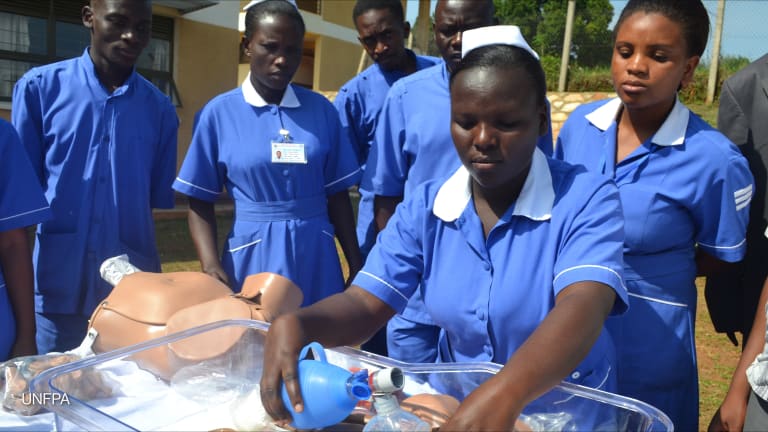
At the Group of 20 in November, the World Bank launched a new Pandemic Fund, which provides dedicated investment for pandemic prevention, preparedness, and response, or PPR, interventions at national, regional, and global levels. In order for the financial intermediary fund to be most impactful, Jonathan Cushing, director of global health at Transparency International, believes it needs to go hand-in-hand with health system strengthening efforts or else risk undermining efforts to achieve universal health coverage by 2030.
“We know creating parallel systems has been an issue for a long time. The Fund has got to get it right. It's got to use the country systems and ensure the downstream reporting mechanisms are complementary to national systems, but also have that voice of civil society of populations in it,” he said.
While the details are still being finalized, the fund will be overseen by a governing board made up of governments and foundations, and manage applications for funding. So far, the fund has generated $1.4 billion in seed funding from 24 donors. According to the bank, it will “incentivize countries to increase investments, enhance coordination among partners, and serve as a platform for advocacy.”
“There's a need to ensure that countries have funding in place as well within their own domestic budgets,” Cushing said, explaining that this funding should be additional to what is allocated to regular health-system strengthening.
The fund comes amid the latest outbreak of Ebola in Uganda, an increase in Mpox cases, and following the COVID-19 pandemic.
“The time is right to realize that pandemic preparedness is much broader than just the classic pandemic preparedness epidemiological strengthening. There's so much that needs to be tackled here: Governance and accountability are key to ensuring responses as well,” Cushing said. “This is about civil society and the government working together.”
Sitting down with Devex, Cushing explained why having a dedicated fund is important when thinking about how the world should respond to future pandemics, where the gaps might be in such a mechanism, and how else pandemic response can be improved.
This conversation has been edited for length and clarity.
Following COVID-19, how important is ring-fenced funding for PPR?
It's important. Politicians and political cycles have short memories. We now have an opportunity where we've got the political emphasis at the moment, but if we look back in history, we know that political interest wanes. There's competing pressure on national and global budgets and preparedness measures tend to be the first things that are dropped. We saw that in the pandemic. The countries that were judged to be most ready for the pandemic — the United States and the United Kingdom — had dropped a lot of measures because of funding pressures. We see that time and time again, so I think it's really important to have ring-fenced funding for PPR.
What are your thoughts on how effective the World Bank’s Pandemic Fund might be?
The timing is right. There's a lot of interest. We've got the pandemic preparedness accord being discussed by World Health Organization member states. They're discussing it again in January and the accord is due to be finalized about 18 months from now. The content is being negotiated, but the aim is that it will be a binding instrument that sets the framework by which we prepare for, and respond to pandemics. Obviously, you need money alongside that to deliver, so the Pandemic Fund is an exciting opportunity to get funding for pandemic preparedness and get systems in place.
One of the concerns we have is that the scope is quite limited. It focuses heavily on getting the classic pandemic preparations such as epidemiological surveillance, monitoring, lab capacity, and disease reporting. It doesn't necessarily make funding available for some of the broader issues around pandemic and emergency preparedness. We've seen again and again inequity in countries' medical supplies and vaccines. That still needs more work. It's not necessarily the role of the bank to address this, but if the Fund is to be successful there needs to be a close collaboration with, and consideration of how we can build on the Gavi [the Vaccine Alliance] models, COVAX, etc.
You were recently involved in a scoping review with the University of Leeds on lessons for the World Bank’s PPR. What takeaways can be taken from that and applied to the new fund?
The key takeaways were that the COVAX Fund was great in principle, on the basis of solidarity, but as soon as countries went and jumped the queue it essentially fell apart. Then there was a race to the bottom of who was prepared to pay the most to get vaccines as quickly as possible. Without collective action, it is impossible to achieve an equitable response.
There also needs to be efforts to ensure greater procurement transparency to avoid pricing inequities and facilitate access. That means disclosure of contracting information, which we haven't seen throughout the pandemic. It's an incredibly opaque process. We've seen countries signing up for lots of indemnity waivers — which means the country bears the risk should anything happen — which has slowed the response. Lots of countries had to make legislative changes to get this enacted, which slowed their ability to access vaccines.
The other key takeaway is to ensure that the fund utilizes national governance, funding, and reporting structures and provides resources to expand existing structures. Similarly, funding priorities need to be decided collectively nongovernmental, civil, and academic actors need to have a voice in national decision-making. This supports country ownership. This has got to be seen as a priority.
How key is civil society engagement to a fund like this?
We've seen historically when there hasn't been civil society engagement that country ownership is not always there and perhaps you don't get the diversity, inclusion, and buy-in to the funds.
Experts urge laying a collaborative pandemic prevention foundation now
Bolstering global pandemic preparedness must happen now. And it must be an intentional, collaborative exercise in building the right ecosystems at local, regional, and global levels, according to health experts speaking at Devex World.
The other part of it — and again, as we've seen in COVID-19 — civil society can act as a check and balance and hold both the bank but also the recipient governments to account. That's important throughout health systems, not just the Pandemic Fund. We'd like to see much greater civil society engagement built in from the start.
Are there other transparency and accountability mechanisms you think should be embedded within the Pandemic Fund’s governance structure?
We'd like to see much greater use of open data and information throughout the Fund — make it mandatory that it uses open contracting principles, that budgets are published, that audits are put in place as well, and that these are reported on.
This means that civil society, activists, media as well as the government can use this information to ensure that things don't go wrong and to improve the health system and its function.
There was great excitement two years ago when the International Monetary Fund put transparency measures in place in the credit facility agreements and emergency funding for COVID-19. The issue there was that it wasn’t fully followed through on — data wasn’t always published by recipient governments, and when it was it was published in a very obscure format, it's not even accessible, can't be used, and people aren't aware of it. This means it's very difficult to hold governments to account. Transparency measures need to be properly embedded and the custodian of the fund needs to take this seriously and follow through with governments to ensure they are actually publishing data.
Are there other ways that you think coordinated action to build stronger health systems while also mobilizing resources for pandemic response could be accelerated?
Transparency International's focus is tackling corruption. We estimate that 7% of the total health expenditure globally is lost, which is about £595 billion ($718.8 billion) a year. If we can recover that, there could be ample funding for health systems. Ultimately if we’re successful in preventing money from being lost, it could be that we don't need additional funds. We need to ensure that there is no wastage or leakage from systems, and corruption doesn’t get in the way of attaining better health for all.








